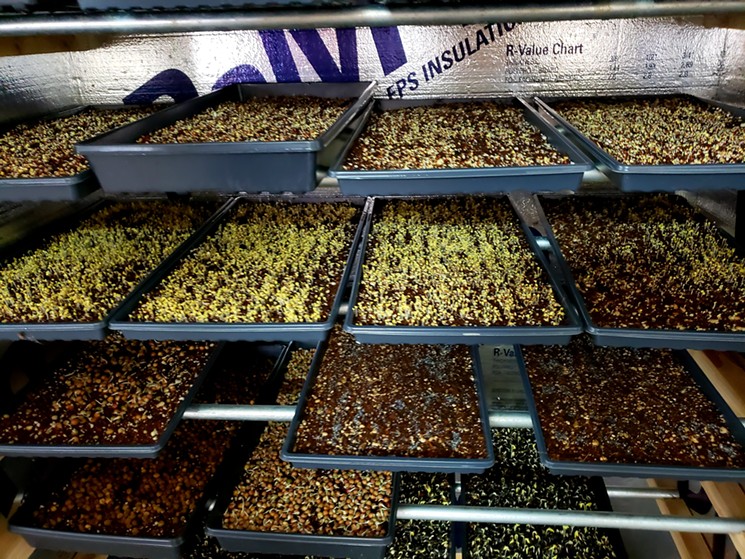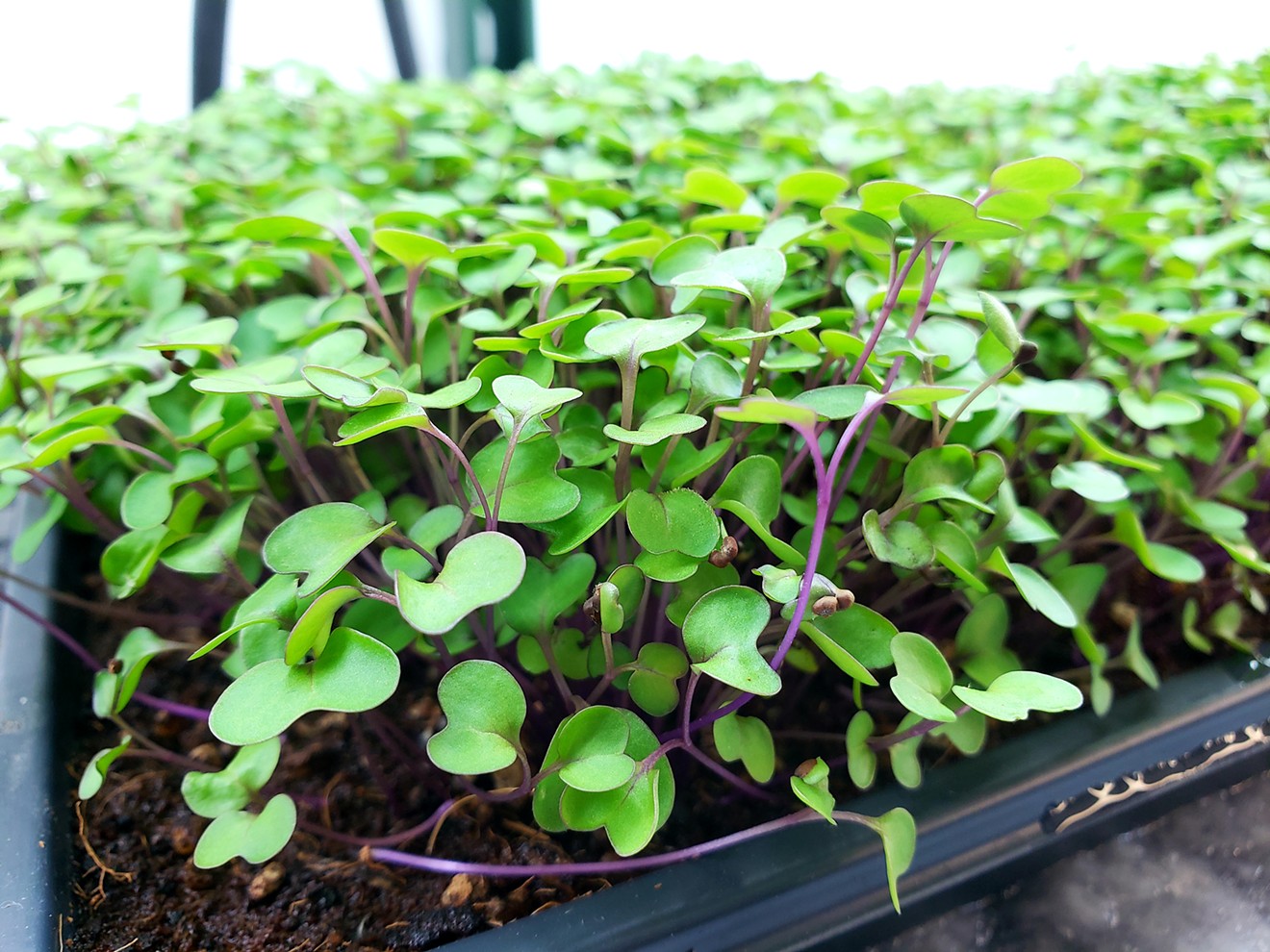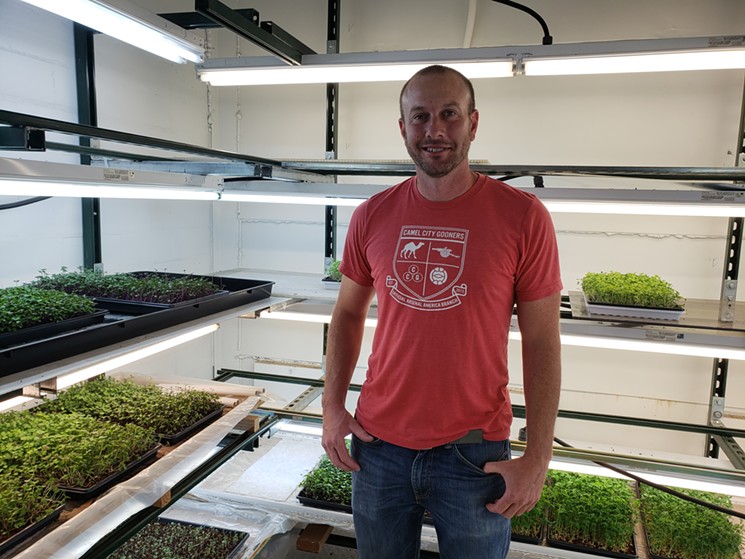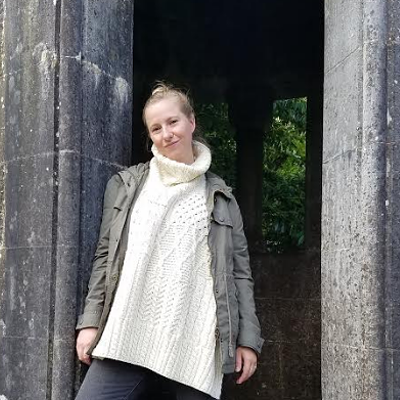"I enjoy growing life here partly because it's an old building and partly because it was a slaughterhouse," he says while touring around the near-empty space that houses Topping Out Farms. "Now it houses life."
It's the kind of building where you know illegal parties happened, and Blynn confirms that by pointing to locked doors sealing off rooms filled with graffiti. Former meat lockers have been repurposed, and Blynn's office is a bare-bones space filled with sunlight and an aquarium full of fish left over from his experiments with aquaponics. They're also Blynn's only current office mates.
In a large room down the hall from his office is the grow house, sectioned off into cubicles flooded with artificial sunlight. Tiny plants sprout in large black trays stacked on racks. The tender shoots of bok choy, peas, mizuna, kohlrabi and sunflower, among others, delicately reach bright-green shoots toward the lights. They are, as many an Instagram photo have proven, the perfect accoutrement to a chef's plate, something to be gingerly placed on a slice of fish or a mound of foam with a pair of tweezers. While that's what modern restaurant-goers envision, the real reason Blynn got into the micro-greens business wasn't for culinary decoration, but for health.
"When I was constantly working long and odd hours, I found myself not eating a lot of vegetables," says Blynn, who worked as a consultant for many years. "I started growing micro-greens as a way to get nutrients into my diet."
Micro-greens are young vegetables harvested two or three weeks after they've germinated. Each batch of Topping Out Farms greens is grown from high-quality seeds in a special coconut coir blend irrigated with triple-filtered water. Blynn dubs these clean plants Elemental Greens and sells them at the farmers' market at Highlands Square and by delivery.

Harlan Blynn made his own germination chamber to help sprout the seeds he buys from Johnny's Selected Seeds in Maine.
Linnea Covington
"I'm not an evangelizer on healthy foods; I eat pizza, I eat hamburgers," he says. "Now I just throw some micro-greens on top and I feel more healthy."
The North Carolina native came to Colorado in 2010 straight from graduate school in Ithaca, New York. Like many who end up here, he fell in love with the state after visiting on a road trip. He moved here with nothing and lived in a truck for the first month. Slowly he started getting consulting projects in Boulder and built up an independent business — until last year, when he decided to change it all up and go the farming route.

Some of the seed Blynn uses to grow his nutrient-dense micro-greens at Topping Out Farms.
Linnea Covington
So he started focusing on creating Topping Out Farms last August and put all his energy into creating not only a way to grow nutrient-dense greens, but also a business that will hopefully benefit the neighborhood, as well. Globeville, he says, is a food desert where many residents who work in food service are employed by fast-food restaurants. To push his initiative more, Blynn just got the green light from his landlord to take over a 6,000-square-foot lot in the back of the building to start what will be Denver's first urban farm to act as a food accelerator program, which he is doing in tandem with Denver Botanic Gardens and CSU Extension Denver.
"I want to grow this business to give people in the neighborhood living-wage jobs in the food industry and show people that there is actual money to be made," he says. "I want to make a business out of farming, one that can push younger generations to think more about it. What I am trying to change is the economic status of farmers" — and with that, the future of farming.
Blynn is just starting small, one tray of healthy micro-greens at a time.





















